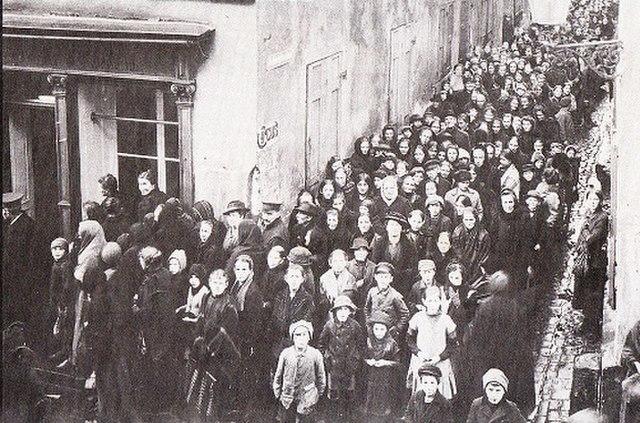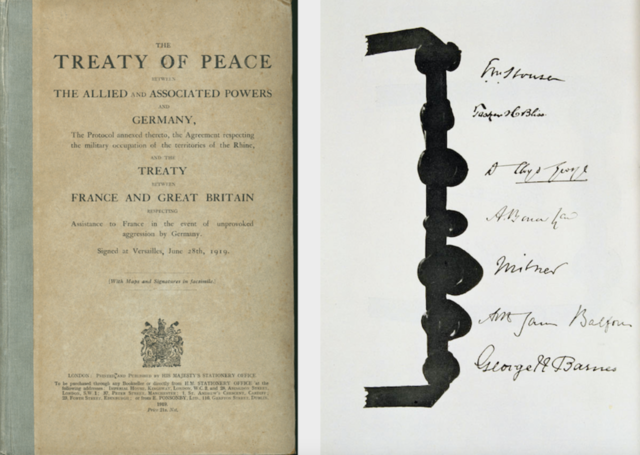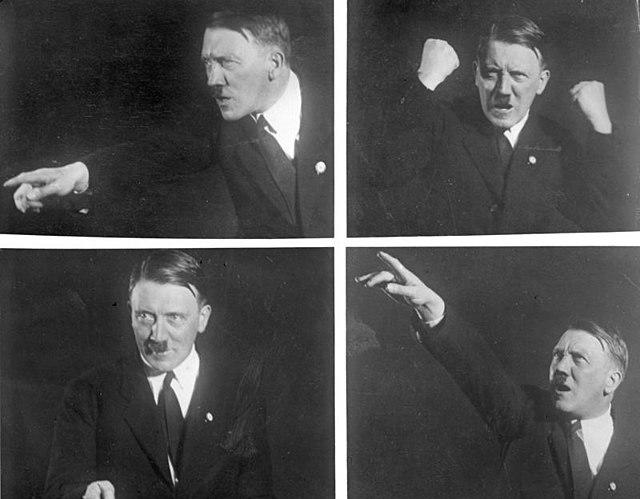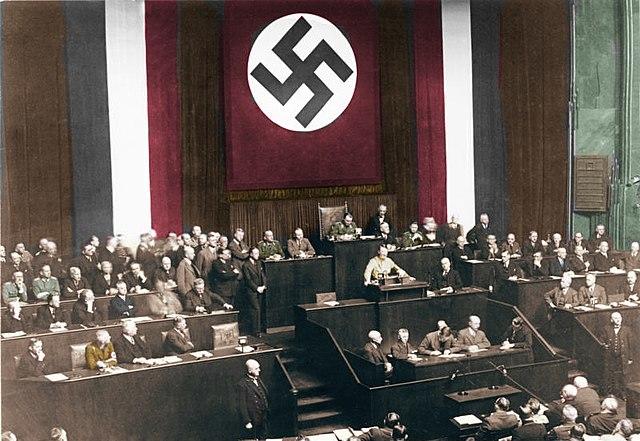Chapters
- Why Did Germany Struggle After World War 1?
- How Did the Treaty of Versailles Influence German National Sentiment?
- What Impact Did the Great Depression Have on the Nazi Party’s Popularity?
- Why Were People Attracted to Hitler's Speeches?
- How Did the Nazis Gain Complete Control?
- How Did Other Countries React to Nazi Germany?
- Conclusion
In the aftermath of WWI, Germany found itself facing an uncertain future, one which would eventually culminate in the birth of Nazi Germany. In this article, part one of a series on WW2, we’ll take a closer look at the various factors that contributed to this dark chapter in history. We'll explore the deep impact of the Treaty of Versailles on German attitudes, how the Great Depression added fuel to the fire, and the way Hitler's powerful speeches played into the fears and hopes of the German people.
This journey through history will reveal how the Nazis gradually took power and how the rest of the world reacted to these alarming changes. Join us as we step into this crucial period, aiming to understand the events that led to this catastrophic turn in world history.

Why Did Germany Struggle After World War 1?
After the events of WWI, Germany would go on to find itself facing severe political and economic instability. In a way, the war had broken the country, leaving it to struggle with various negative factors, including an immense debt, a crippled economy, and increasing unrest among its citizens.
To make matters worse, many Germans believed that their home country had been betrayed from the inside rather than defeated by actual military forces, leading to increasing discontent against the Weimar Republic, Germany’s government of the time.
Alongside this, losing key regions and the heavy cost of war payments also worsened the country's economic troubles, eventually leading to massive hyperinflation. Unfortunately, it was these factors that would cause extremist ideologies to begin to take root amongst some of the populace, due to their desire for stronger leadership and more stability.

How Did the Treaty of Versailles Influence German National Sentiment?
For many Germans, especially those who fought in the war, the Treaty of Versailles was a source of strong humiliation and resentment. Due to Germany’s actions in WW1, the treaty imposed a series of pretty harsh penalties on the country, including the seizing of its territory, restrictions on its military, and hefty cost of war payments.
However, these penalties didn’t affect just those in charge or the rich and powerful, they also took a burden on the general populace as well. Due to this, a large percentage of German civilians felt the terms were unfair and unjust, leading to an ever-increasing national sense of injustice across the board.
Sadly, this widespread feeling of humiliation would eventually be taken advantage of by many different nationalist groups, including the Nazi Party, who portrayed the treaty as a symbol of the broader injustices inflicted upon Germany as a whole. Eventually, this narrative would play a massive role in the rise and popularity of Adolf Hitler, who promised the people that he would overturn the treaty and return Germany to its once powerful state.

What Impact Did the Great Depression Have on the Nazi Party’s Popularity?
Unfortunately, the Great Depression, which began in 1929 would become a key factor in the Nazi’s rise to power. Germany, already struggling with the aftereffects of WW1, would face further economic turmoil due to the unprecedented global economic crisis. Throughout the country, unemployment soared and many people found themselves facing the very real threat of being unable to provide for themselves or their family at home.
Sensing an opportunity to gain power, the Nazi Party, led by Adolf Hitler, capitalized on the turmoil and anxiety by offering the general public a way forward. How did they do this? Well, they offered simple solutions to complex problems, blaming Germany’s hardships on external enemies and internal betrayers, primarily focusing on Jewish people and the existing government.
Sadly, this narrative would resonate with many desperate and disillusioned Germans, leading to a massive surge in support for the Nazi party. By painting themselves a sort of saviour of Germany, the Nazis had attracted the large following needed to fuel their rise to power.
Why Were People Attracted to Hitler's Speeches?
Hitler's speeches actually played a big part in his rise to power. Regarded as a master orator, he succeeded in captivating many Germans with his intense and passionate speeches which were designed in such a way to tap into the fears, frustrations and hopes of the people. More often than not, his speeches would primarily focus on the themes of national revival, strength, and unity, while painting Jews, communists and other perceived enemies of Germany as the main reason for its troubles.
Over time, this skill influenced the public into believing Germany would prosper under Nazi rule, leading to even further support for the Nazi cause. In fact, without his skill for orating, it’s unclear whether Hitler would have gained as much support as he did.

How Did the Nazis Gain Complete Control?
So how did the Nazis actually manage to take control of Germany? Well, they did so by combining legal methods with more forceful action. Firstly, Hitler would be appointed chancellor of Germany by the president of the time, Paul Von Hidenburg. Although the Nazis were not the majority party in the Reichstag (German parliament) their increasing political influence and manipulation of the political situation led to this appointment.
Essentially, this major event in history sparked the beginning of the transformation of the Weimar Republic into the Nazi regime. From here, Hitler would take advantage of the Reichstag fire in 1933 to declare a state of emergency, giving himself free rein to suspend people's basic rights and take whatever action he deemed fit against his political enemies.
Soon after this, Hitler would award himself even more power by passing the Enabling Act, a law that allowed him to make decisions without the approval of parliament. It was this move that marked the beginning of the Gleichschaltung process, where all aspects of German society were soon brought under Nazi control. For example, many of Hitlers political opponents were arrested and imprisoned soon after, while trade unions and other political parties were outright banned. With these actions, Hitler had replaced the Weimar republic's former democratic system with a new totalitarian regime where he had almost total control.

How Did Other Countries React to Nazi Germany?
As the Nazis began to take a foothold in Germany, many other countries initially reacted with caution, seeking to avoid another devastating war from breaking out. Part of this came down to the effects of the Great Depression - most countries were more concerned with their own problems at home than what was happening in neighbouring countries.
Additionally, some countries also believed that by allowing Germany to regain some power and territory, it would become more satisfied and less aggressive. This policy, known as "appeasement," was most famously pursued by Britain and France. They believed that by giving in to some of Hitler's demands, like allowing him to annex parts of Czechoslovakia, they could avoid war in general. However, this wouldn't last long. As Germany became more and more aggressive, international concern would begin to grow. The final straw would come with the invasion of Poland in 1939, leading Britain and France to declare war and causing WW2 to break out.
Conclusion
In conclusion, the rise of Nazi Germany can be traced back to the aftermath of World War I, a time when Germany grappled with severe political and economic challenges. These were further aggravated by the conditions of the Treaty of Versailles. Furthermore, as the Great Depression deepened the nation's woes, it created an opportunity for the Nazi Party's rise to power. Hitler's compelling speeches resonated with the German populace, effectively tapping into their fears and aspirations. This period, marked by other countries' reluctance to confront Germany, ultimately paved the way for World War 2.








